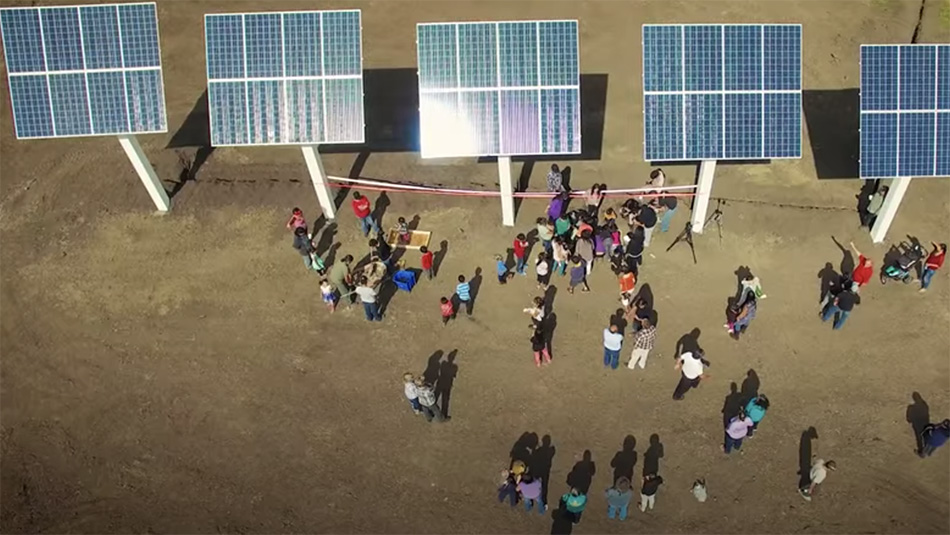In the past decade, the term “Just Transition” has gained more widespread understanding among climate campaigners and environmental advocates. A Just Transition is the idea that the shift toward low-carbon economies needs to be fair and inclusive, meaning it considers the people who will be most impacted by abandoning fossil fuels.
Among the groups most likely to be affected by the green energy transition are Indigenous communities, especially those living in remote areas where they’ve often been pushed by governments. Indigenous communities may be disproportionately dependent on fossil fuels for their day-to-day energy needs and livelihoods, particularly in places where government policies and incentives mean that extractive industries account for a large share of local jobs. Curbing oil and gas drilling, mining, and other heavy industries would thus cause significant social and economic disruptions in places that currently have few other opportunities and are already struggling with the impacts of colonization, including systemic discrimination, unfulfilled treaty obligations, and legacy traumas stemming from violence, oppression, and stolen land.

Paradoxically, it is Indigenous communities that are also most likely to bear the brunt of the impacts of climate change. Rapid warming in places like Alaska and northern Canada are already triggering dramatic changes for ecosystems, with immediate consequences for Indigenous communities, including Native traditions and cultures, food security, and the very existence of their villages and settlements due to rising seas and melting permafrost.
But the green energy transition could be an opportunity for Indigenous communities, creating new livelihoods, reducing localized pollution, and freeing up income that would otherwise go toward propane and diesel. It could also help maintain the very ecosystems and climate that have sustained them since time immemorial.
Recognizing this potential as well as a need for a Just Transition for Indigenous Peoples, Melina Miyowapan Laboucan-Massimo of the Lubicon Cree First Nation in northern Alberta founded Sacred Earth Solar in 2015 to empower Indigenous communities across Canada to adopt renewable energy.

Laboucan-Massimo told Mongabay that Sacred Earth Solar was born out of her desire “to push for an end to extractivism in our traditional territories.” She had been advocating on these issues since a very early age, but it was a pipeline rupture that spilled more than 3 million liters (800,000 gallons) of oil near her family home in the village of Little Buffalo in 2011 that moved her to focus on bringing solutions to Indigenous communities.
“I realized, ‘Wow, I need to really start building: What does transition technology look like? What does a just transition look like in our communities?’”
Sacred Earth Solar’s first project was a 20.8-kilowatt system powering the health center in Little Buffalo.
But Laboucan-Massimo’s work isn’t limited to Sacred Earth Solar. She is the Just Transition director at Indigenous Climate Action, an Indigenous-led organization that advocates for Indigenous communities and Indigenous-led solutions; a renewable energy fellow at the David Suzuki Foundation; and the host of the Power to the People TV series that profiles sustainability initiatives among Indigenous communities in Canada. Laboucan-Massimo also continues to advocate for social justice, including speaking out on violence against Indigenous women, and serves on the boards of Seeding Sovereignty and NDN Collective and the executive steering committee of the Indigenous Clean Energy Social Enterprise.

Laboucan-Massimo says the obstacles Indigenous communities face in trying to secure a Just Transition are myriad and substantial.
“Indigenous communities are on the receiving end of massive extraction zones and a lot of environmental degradation,” she said. “We’re also on the receiving end of cultural and environmental genocide, where it’s really impacting people on a very fundamental level.
“Indigenous communities are operating in crisis situations in many arenas. Not only are we experiencing the brunt of colonization — there’s a lot of undoing of really detrimental government and colonial policies that were tearing apart the social fabric of communities and governance structures, and we are rebuilding all of these —but we’re also fighting being forcibly pushed from land and encroachment by very toxic developments in and around our communities.”
Laboucan-Massimo spoke about these issues and more during a March 2021 conversation with Mongabay.

